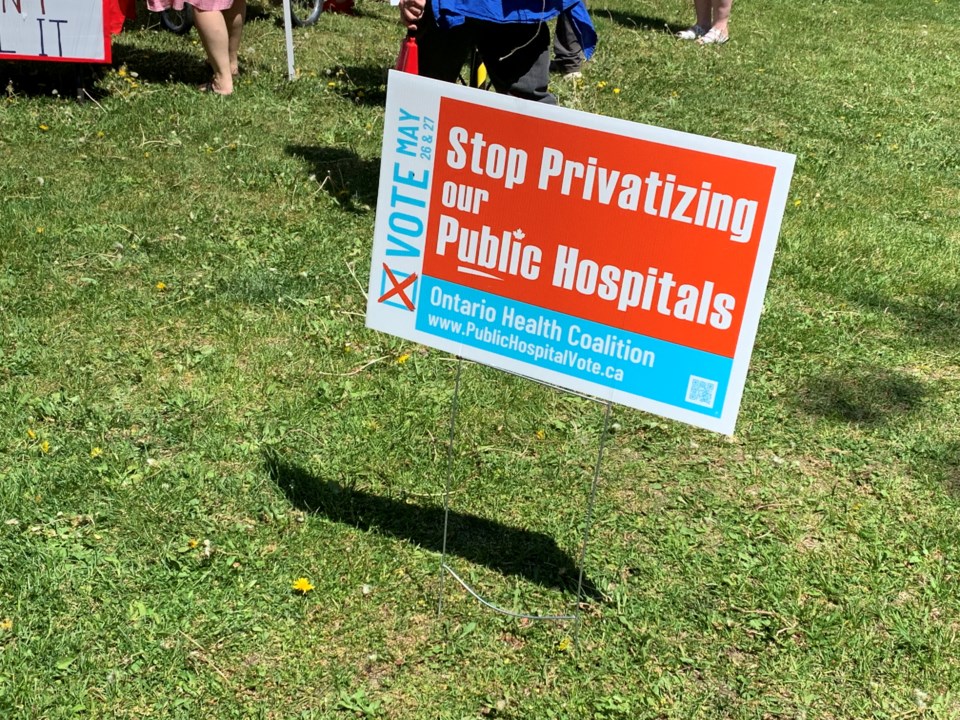OrilliaMatters welcomes letters to the editor at [email protected] or via the website. Please include your full name, daytime phone number and address (for verification of authorship, not publication). The following letter is in response to a referendum held earlier this year about the privatization of health care in Ontario.
It’s not only the Greenbelt at risk of being sold to unscrupulous speculators.
The Simcoe County Health Coalition is deeply concerned about the privatization of health-care services, and we are not the only ones concerned.
In May, we invited citizens of Simcoe County to vote on a referendum about this subject and 15,385 people responded to our call. The overwhelming majority (99 per cent) voted against privatizing hospital services.
During the referendum campaign, we talked with thousands of people from all walks of life. Most were very skeptical of the government’s message and angered by the inaction on key subjects like wait-times — for procedures, specialists and to be seen in an ER — and staffing levels in hospitals.
Many respondents mentioned their fear that corruption was part of the reason for the collapse of our health-care system. In light of what is now known about the Greenbelt deals, it is possible that backroom deals also apply to the health-care portfolio.
Since they came into power, the current provincial government has made several detrimental decisions related to health care that cast doubts on their declaration to be “for the people.”
Let’s take a look.
The severe under-funding and under-staffing of our public hospitals are more evident every day, causing long wait-times and even closures of emergency rooms all over Ontario, especially in rural areas. We had a wave of an unprecedented number of permanent or partial ER closures.
Since January, there have been more than 100 temporary emergency closures across Ontario, in addition to the permanent closure of the emergency department in Minden.
Under the Ford government, Ontario is now the province with the least number of hospital beds per capita and the least spending in hospitals in the country. They have underspent the health-care budget by $1.7 billion, and the Ministry of Health is yet to unveil a comprehensive and urgent plan for the recruitment and retention of much-needed hospital staff.
Why would nurses and other medical staff come back to work in hospitals if they are underpaid, understaffed, overworked, and overwhelmed?
In the meantime, the government is spending precious taxpayers' dollars appealing the Bill 124 court ruling. This bill enabled the government to freeze public servants' salaries at one per cent increase annually. This affects the salaries of nurses, personal support workers, medical personnel, and any number of other professionals working for the government.
The court ruled this was unconstitutional and declared it void.
The Ford government is contesting this ruling while nurses leave the public health-care system in droves.
Who is benefiting from all this chaos? Mostly private companies. Nursing agencies, private clinics, private insurers, for-profit corporations like the ones operating long-term care facilities — see the recent Ombudsman report on long-term care to understand why they should have never been privatized — and all sorts of private entities have started to proliferate to fill “the gaps” in the system that the current government is causing.
How is this possible, many have asked us, considering that health care is a universal right and protected by the Canada Health Act? One answer: Bill 60.
Bill 60 was specifically designed to widen the loopholes that allow private health-care companies to enter our system, essentially creating fertile ground for our health-care system to become a two-tiered system. It eliminates the oversight over private entities that may enter the health-care system; deregulates health-care staff so no qualifications are needed for a person to call themselves a doctor, a surgeon, a nurse, an MRI technologist, a respiratory therapist, etc.; shields the new private clinic applicants’ information and the financial information of the deals made with the province from freedom of information legislation, essentially erasing transparency and accountability; and allows private clinics to up-sell services.
Bill 60 was bullied through the legislature without due process and without consultations, in much the same way that Bill 23, which allows the sale of the Greenbelt, was.
If there are not enough red flags already, recently the Ford government granted new 30-year contracts and provided money for major expansions to the worst of the for-profit corporations operating long-term facilities. After thousands of deaths during the pandemic from mismanagement and poor practices, the money is going to them rather than to our fund-starved hospitals.
We believe that accessible and high-quality health care should be available to all, regardless of their financial situation. Privatized services cost more, whether they are paid out-of-pocket or through our taxes.
Privatization removes essential staff from hospitals, causing more closures and increased wait-times. The recently released long-term care report and other studies comparing public and private health care show privatization reduces accountability and leads to poorer outcomes.
Privatization will compromise the well-being of our communities, and we are taking a stand to protect our health-care system.
The Ontario Health Coalition has organized a powerful demonstration in opposition to health-care privatization. On Sept. 25, 2023, members of the Simcoe County Health Coalition will be taking the GO train to join concerned citizens at a massive protest at Queen's Park in Toronto.
We invite all concerned residents, health-care professionals and supporters to join us. Let your voice be heard and help us defend our public health care. Contact [email protected] or 647-835-7870 to reserve a spot on the GO train.
Event Details:
Date: Sept. 25, 2023
Time: Meet at 8:30 a.m.
Location: Barrie South GO Train Station.
Destination: Queen's Park, Toronto
Anisa Carrascal
Simcoe County Health Coalition, co-chair



